The OnePlus 3 is the company’s newest budget flagship smartphone. This is the third generation high-end smartphone from OnePlus which is popular for putting top-of-the-line specs in a phone that has the cost of a mid-range device. Undeniably, this phone seemed to be outstanding on paper with its 6GB of RAM, Snapdragon 820 processor, 5.5-inch Optic AMOLED display and much more. But, does it live up to the hype? Let’s find out in this review why the OnePlus 3 has been dubbed as the flagship killer.
Table of Contents
The full metal unibody of the OnePlus 3 is made up of a premium material specifically, an aluminum alloy which contributed to the much lighter weight at just 158 grams and thinness of the device at 7.33mm, which is nearly the same as the LG G5 and the Samsung Galaxy S7. Handling the device is not that difficult even with one-handed usage. However, the smooth metal build of the device makes it quite slippery that may probably give you a reason to put up a back cover or case right away to prevent any accidental slip or drops.
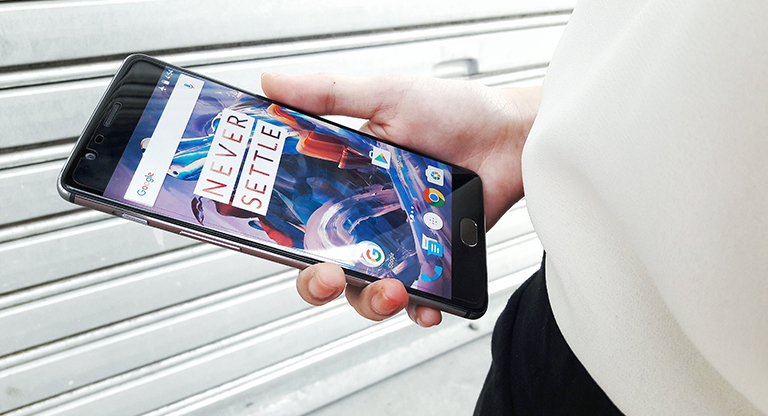
The front panel is fully covered with 2.5D Corning Gorilla Glass 4 that tapers down near the edges. Located at the upper left side are an 8-color RGB notification LED and an 8-megapixel front camera situated before the sensors.

On the chin part of the device, there are three capacitive buttons — Recent Apps, Home which doubles as a fingerprint sensor, and Back. However, you could swap the order of recent and back keys on the Settings menu and you also have the option to use on-screen navigation if you like.
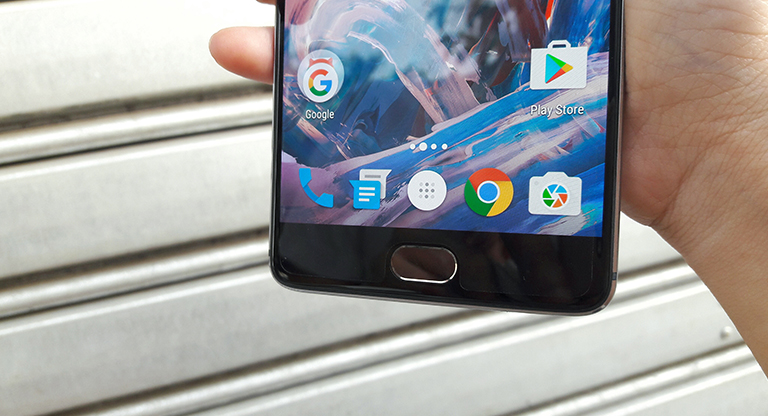
The right side is where you’ll find the power/lock button with the SIM slot next to it. The SIM tray supports dual nano-SIM cards. Unfortunately, there’s no slot for microSD card, so space is limited to the 64GB internal storage.
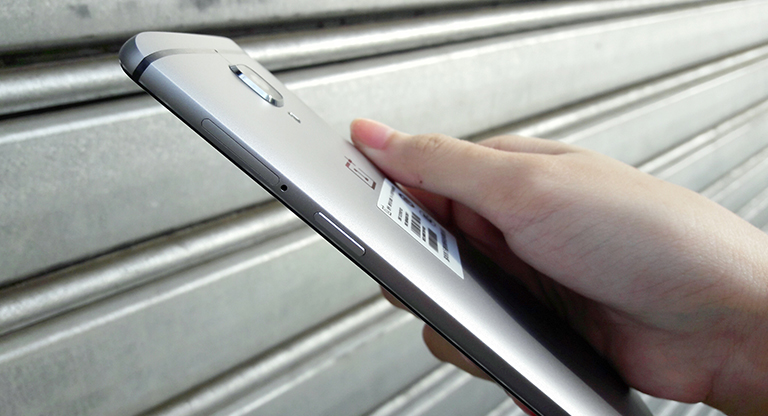
The left side has the volume rocker and an alert switch that was first introduced on the OnePlus 2. This two-stage switch lets you selectively mute alerts based on priority and notifications you want to receive.
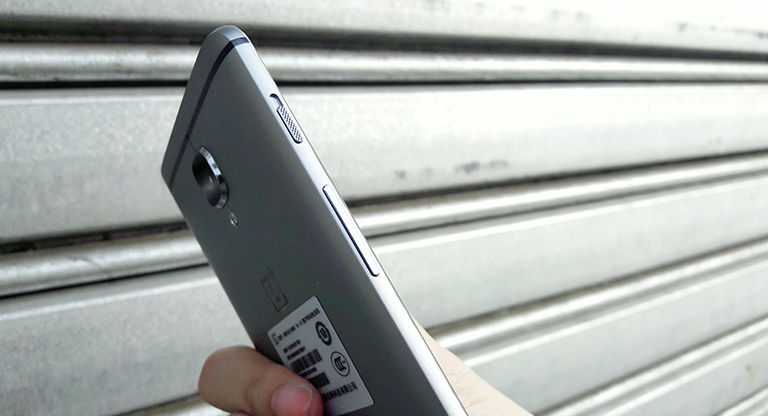
At the bottom end are the built-in speaker, a 3.5mm headphone jack and a USB Type-C port with support for up to 4A/5V charging that allows the device to reach 60% battery life in about half an hour.
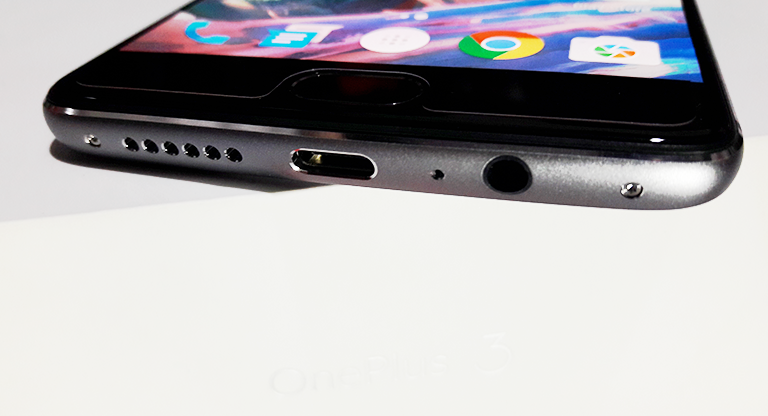
There’s a OnePlus logo printed on the gently curved back, solid antenna lines across the top and bottom, single LED flash and a slightly raised camera lens just right below it.
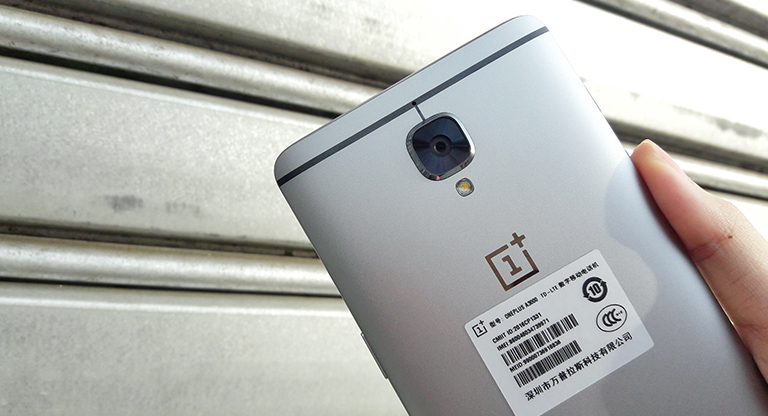
On the front of the device is a battery-efficient Optic AMOLED display (which is actually just Super AMOLED) with really thin side bezels, measuring at 5.5-inch in a Full HD resolution instead of the current flagship standard of Quad HD.
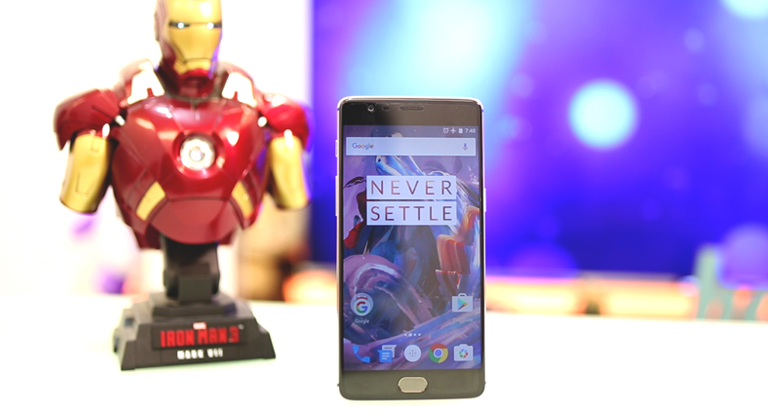
The display is bright with vivid colors, great contrast level and deeper blacks that give splendid experience even when you are using it outdoors. Somehow, the calibration is off but there’s an option to tweak the color balance of the screen from the Settings menu. There’s also an ambient display mode that lets you glance at incoming notifications without having to switch the display on.
The OnePlus 3 features its own custom OS called OxygenOS which is based on Android 6.0.1 Marshmallow. It also didn’t come preloaded with a bunch of not so useful bloatware. Overall, the interface has a close-to-stock feel with a few added customization to your liking.
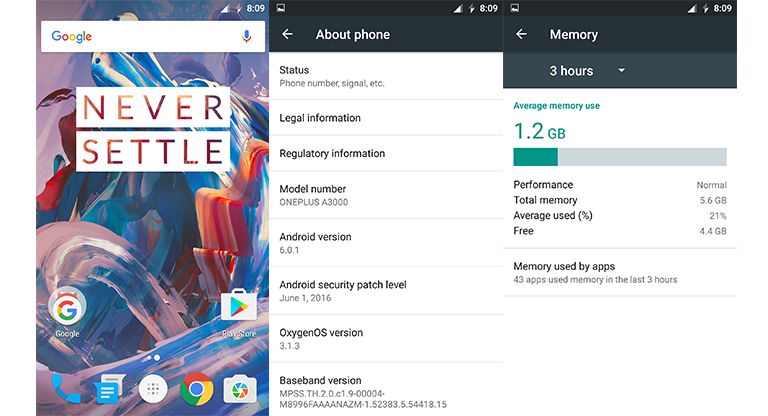
On the device, you have the ability to enable a system-wide dark mode, edit quick toggles and status bar icons, and of course night mode, which throws an orangey cast over your display to be easier on the eyes at night. You can also customize the 8-color LED notification light for global notification, battery status indicator, and individual apps.
Users can choose between on-screen or capacitive navigation buttons, and change the layout of the recent and back buttons based on your preference. There’s also a feature called Shelf which gives you access to your frequent apps and can be customized by adding widgets of different applications installed on your device.

That said, the issue of software update on OnePlus devices is a point to contest because as far as we can remember, the Marshmallow update for the OnePlus 2 has arrived eight months after the latest Android flavor became available. Nevertheless, the company is doing good in terms of monthly security patches.
The rear camera sports a 16-megapixel Sony IMX298 sensor which is the same with the Huawei Mate 8 and Asus ZenFone 3 and has f/2.0 aperture, electronic and optical image stabilization, and phase detection autofocus. You can also shoot videos in 4K but you might want to keep it at 1080p due to its limited 64GB storage. It produces clear, vibrant with not so over saturated images. Selfie camera quality isn’t the best under poor lighting condition but it still manages to produce sharp images in well-lit situations.

You can quickly launch the camera with a double press of the power button, and the camera app itself is similar to Google’s stock camera. It also features a manual mode for white balance, ISO, shutter speed, and manual focus tweaks. HDR mode is also enabled by default for better low-light performance.
Here are some sample photos and videos we took using the camera:
The speakers at the bottom provide clear and loud audio. The sound is decent enough considering it’s coming out of a mono down-firing speaker with less bass to speak of.
The OnePlus 3 is powered by the latest Qualcomm Snapdragon 820 processor with 6GB of RAM which is more than enough compared to the 3GB or 4GB we usually get with high-end handsets. It can run multiple apps and games at the same time and jump between them without waiting for them to reload. However, the device tends to slow down if you re-launch a certain app when there are more than six applications in the background. In other words, it can’t cope with keeping more apps in memory, probably due to overly aggressive memory management which will be fixed on the next 3.1.4 OxygenOS update.
The slightly recessed fingerprint scanner is incredibly fast. It can wake the phone from standby and unlock the phone in just 0.3 seconds when you place your finger on top of it.
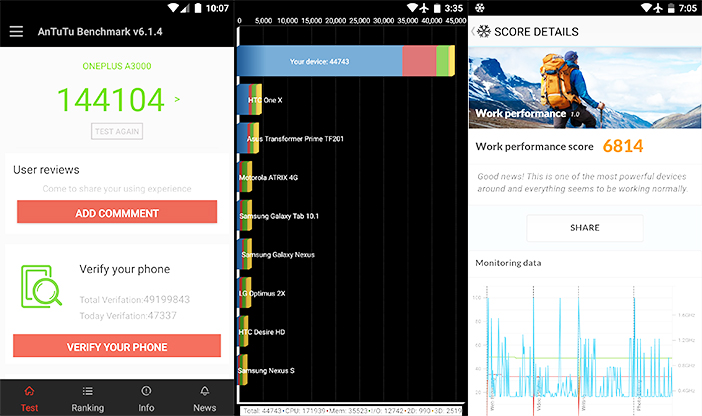
Overall, the OnePlus 3 can handle highly demanding applications with utmost ease. It is also intended to mobile gamers with its Adreno 530 GPU, it can smoothly run graphics-intensive game like NBA 2K16, Injustice: Gods Among Us, and Dead Trigger 2.
OnePlus 3 still supports dual-Nano SIM aside from the usual Wi-Fi, Bluetooth, and GPS onboard. NFC also makes a welcome comeback after being omitted on the previous OnePlus 2. Call quality and Data Connectivity is excellent; we didn’t experience any call drops while making phone calls regardless of any network type, even it is set into 2G, 3G or 4G.

The battery is built-in at 3000mAh and supports OnePlus’ latest Dash Charging Technology which claims to charge the device of up to 60% in just 30 minutes. With this technology, we are able to fully charge the device super-fast for about an hour. Using our PC Mark Battery Life Test, the OnePlus 3 hits 8 hours and 22 mins, and in our video loop test, the OnePlus scored 11 hours and 06 mins in a single full charge playing a Full HD movie. While on my own assessment, I usually get an average of 5 hours screen on time with moderate usage.
The OnePlus 3 is a major win — with its premium build quality, excellent camera quality, top-level performance, dash charge technology, NFC, and USB type-C that only costs half compared to other flagship phones. Though it’s still not perfect, I just wished that the company didn’t remove its support for microSD card expansion and put a bigger battery (probably 3400mAh) but that’s just me.

The OnePlus 3 is not yet officially released in the Philippines but you can get it from online sellers like Widget City for Php 20,990 (see listing here).
Author’s Note: I am writing this review after a week I purchased the device for myself which also gives me an ample time to provide in-depth details and conclusion. This will also be my daily driver so if you need any help regarding this phone, don’t hesitate to send me a message thru email or chat – FB/Twitter: helandortega
OnePlus 3 specs:
5.5-inch Optic AMOLED display @ 1920×1080 pixels, 401ppi
Corning Gorilla Glass 4
Qualcomm Snapdragon 820 2.15GHz quad-core processor
Adreno 530 GPU
6GB LPDDR4 RAM
64GB internal storage
4G LTE Cat. 6
Dual-SIM
WiFi 802.11a/c
Bluetooth 4.2
NFC
16MP rear camera with Sony IMX298 sensor, OIS, PDAF, LED flash
4K video recording
8MP front-facing camera with Sony IMX179 sensor, EIS
3,000mAh Li-Ion battery
Dash Charge support (5V 4A)
Oxygen OS 3.1.3 (Android 6.0.1 Marshmallow)
What we liked about it:
* Premium and minimalist all-metal design
* Sharp AMOLED display
* Great overall performance
* Excellent camera quality
* Super-fast charging
* Vanilla Android UI
* Very affordable (perfect for a budget flagship smartphone)
What we did not like:
* Average battery life
* No micro-SD slot
* Lack of third-party Dash Charge accessories (at least for now)

YugaTech.com is the largest and longest-running technology site in the Philippines. Originally established in October 2002, the site was transformed into a full-fledged technology platform in 2005.
How to transfer, withdraw money from PayPal to GCash
Prices of Starlink satellite in the Philippines
Install Google GBox to Huawei smartphones
Pag-IBIG MP2 online application
How to check PhilHealth contributions online
How to find your SIM card serial number
Globe, PLDT, Converge, Sky: Unli fiber internet plans compared
10 biggest games in the Google Play Store
LTO periodic medical exam for 10-year licenses
Netflix codes to unlock hidden TV shows, movies
Apple, Asus, Cherry Mobile, Huawei, LG, Nokia, Oppo, Samsung, Sony, Vivo, Xiaomi, Lenovo, Infinix Mobile, Pocophone, Honor, iPhone, OnePlus, Tecno, Realme, HTC, Gionee, Kata, IQ00, Redmi, Razer, CloudFone, Motorola, Panasonic, TCL, Wiko
Best Android smartphones between PHP 20,000 - 25,000
Smartphones under PHP 10,000 in the Philippines
Smartphones under PHP 12K Philippines
Best smartphones for kids under PHP 7,000
Smartphones under PHP 15,000 in the Philippines
Best Android smartphones between PHP 15,000 - 20,000
Smartphones under PHP 20,000 in the Philippines
Most affordable 5G phones in the Philippines under PHP 20K
5G smartphones in the Philippines under PHP 16K
Smartphone pricelist Philippines 2024
Smartphone pricelist Philippines 2023
Smartphone pricelist Philippines 2022
Smartphone pricelist Philippines 2021
Smartphone pricelist Philippines 2020
ARgsss says:
Yugatech, sana may review kau ulit para sa phone na ito, after nun next update nila. Nakakdissapoint kasi RAM management nito, okay na okay sana itong phone na to.
Ronald says:
This will be my first bad comment to the author as quote “* Very affordable (perfect for a budget flagship smartphone)”
How was this “very affordable”? It seems that you have been born with a silver spoon in your mouth that you do not know how people work hard their ass off that for you a 20K phone is “very affordable”
I suggest that you try to put on a shoe of an ordinary average / minimum wage earners so you can see how much worth the 20K Phone really is.
I apologize for the remarks but it might have been my first time seeing an author saying to all the people subscribed to Yugatech that 20K phone is very affordable for him.
On your next review with a 20K phone you can put in “Prize is lower than its counterparts” instead of saying its very affordable / budget” when in fact it is not for most.
Sorry again.
Heland Ortega says:
I’m afraid you’ve only read the last part and not the whole article :)
“The OnePlus 3 is a major win — with its premium build quality, excellent camera quality, top-level performance, dash charge technology, NFC, and USB type-C that only costs half compared to other flagship phones.”
Anon says:
It’s affordable for a flagship phone, ano kaya nakaka-trigger don. smh
Harold says:
Tanga tanga naman this boy
Emil says:
No sd card slot, </3
Clyke says:
Nakakasagap din ba toh ng LTE for Smart or Globe?
Other phones kasi kahit 4G or LTE enabled, di pa rin compatible sa philippines.
theAuthor says:
make sure you buy the Asian version and not the China release, widget city is selling the Asian version(from hongkong)
theAuthor says:
wala naman talagang sd card support yung Oneplus since oneplus one, oneplus 2 and ngayon sa 3, 64GB naman, ok na ok,
rongki says:
is the oneplus 3 from widgetcity china release or intl release? Thanks
CVM says:
I’m thinking of buying this phone on Widget City..is it legit?
hahahha hahahaha says:
How can we personally check if it is china release or international? I also want to buy one.
hahahha hahahaha says:
Asian veraion ba talaga? Sabi ng personnel nila China version daw ang binebenta nila. Natest ba and fully compatible ba ang LTE?
andro says:
meron naba nito sa sm calamba